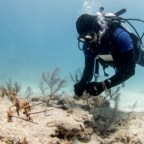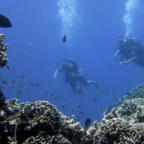
Coral around the world has been dying at unprecedented rates, largely the result of warming ocean waters due to climate change. Now, the International Coral Reef Society’s scientists have published what they call the “Pledge for Coral Reefs,” a list of 12 actions everyone can take to help protect coral and coral reefs.
“This is an educational tool to remind people that, ‘Wow, when I purchase products with single-use plastic, that affects coral reefs. When I don’t eat sustainably, that affects coral reefs. If I don’t vote, that affects coral reefs. So many environmental and climate change related issues impact coral reefs,” said Andréa Grottoli, professor of earth sciences at The Ohio State University and president of the International Coral Reef Society.
“Each of these actions is related to sustainability, moderating climate change and environmental protection,” said Grottoli, who led the development of the Pledge for Coral Reefs.
The society, founded in 1980, is an international group of scientists that focuses on developing and sharing scientific knowledge that can be used to help preserve coral reefs and coastal ecosystems, which prevent coastal erosion and provide homes and food for ocean life.
The pledge includes actions concerning how people can support policies that protect coral reefs, ways people can reduce their carbon footprint to help mitigate climate change, and things people can do to promote education and awareness of coral reefs.
The society is also advocating for the kind of large-scale policy decisions that can make broader change as part of its larger Plan of Action. But, Grottoli said, those kinds of policy changes often get implemented when more people care about coral reefs and what happens to them.
“This is not just a high-level governmental problem,” she said. “This is something everyone can do — a small thing or maybe many things — to do their part to help save coral reefs.”
The pledge includes 12 actions:
- Voting for conservation-based policies that help reduce greenhouse-gas emissions, the primary contributors to global warming
- Advocating for science-based decisions and reef protection
- Communicating to policymakers that protecting coral reefs is a priority
- Refusing single-use plastics
- Eating food that is sustainably produced and locally sourced
- Limiting the use of products that contain chemicals that can harm reefs — specifically looking for reef-conscious sunscreens or wearing clothing that offers SPF protection
- Cutting carbon emissions by walking, biking, carpooling, taking public transit or driving an electric vehicle
- Reducing energy consumption
- Purchasing carbon offset credits to mitigate air travel and other carbon-intensive activities
- Participating in local actions like beach cleanups and fundraisers that support coral reefs
- Educating yourself and others about the threats to coral reefs and the best ways to protect them
- Sharing the pledge with others
Grottoli said the society based the pledge on specific and attainable actions that everyone could take to help protect coral reefs. The society began talking about the pledge last year, but finalized it over video-conference meetings because of the COVID-19 pandemic.
“Part of this is to recognize that we all have an individual responsibility, that, yes, if everyone makes some changes, it does reduce our CO2 footprint,” Grottoli said.
She pointed to data that showed carbon dioxide emissions — a primary contributor to global warming — decreased in the early days of the COVID-19 pandemic, when people worked from home and travel decreased.
“It’s not that we can’t do it — we can, and COVID has proven that we can make dramatic changes in how we use and consume energy to do our jobs, that we can do it very quickly and not lose productivity. And I think part of this pledge is to remind people that what they do every day matters.”















Social Profiles